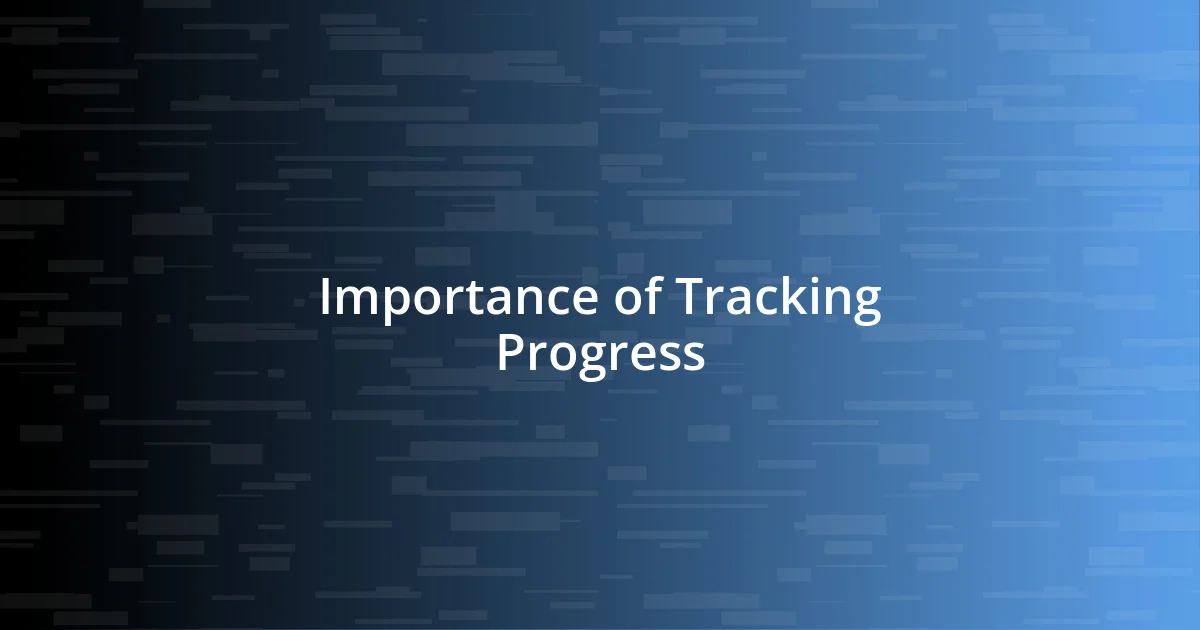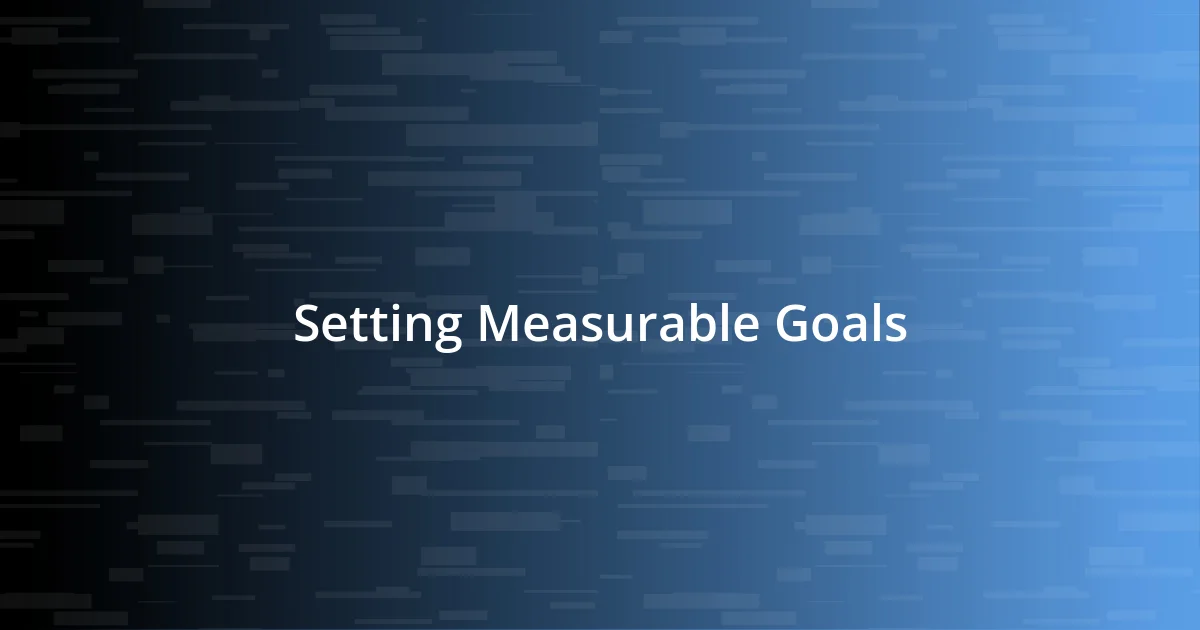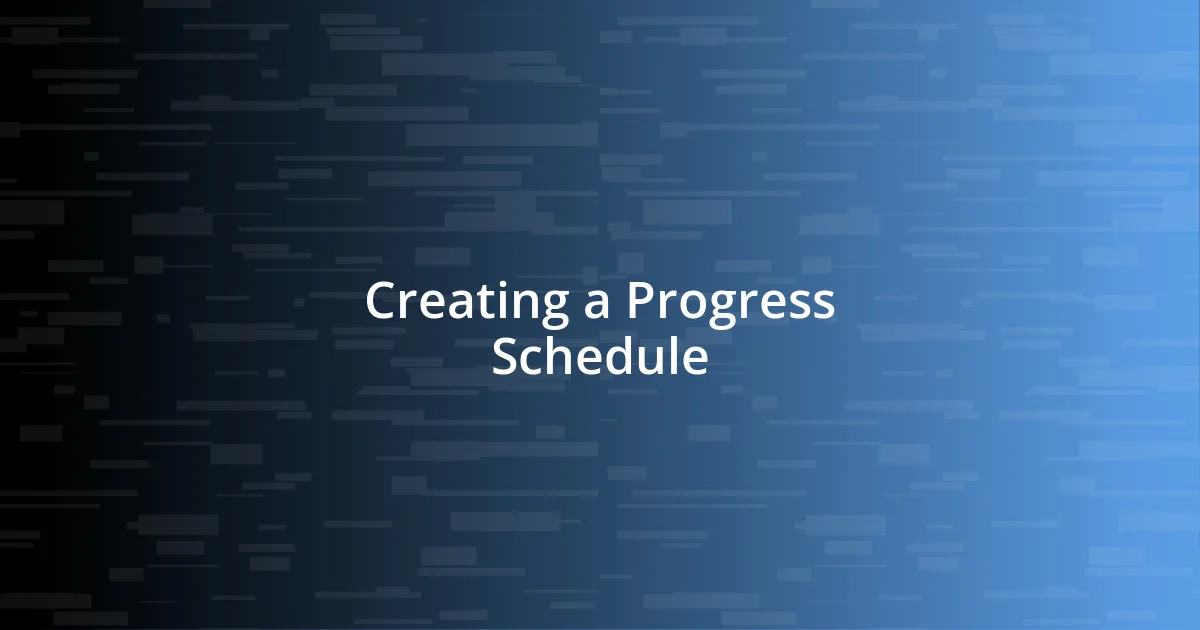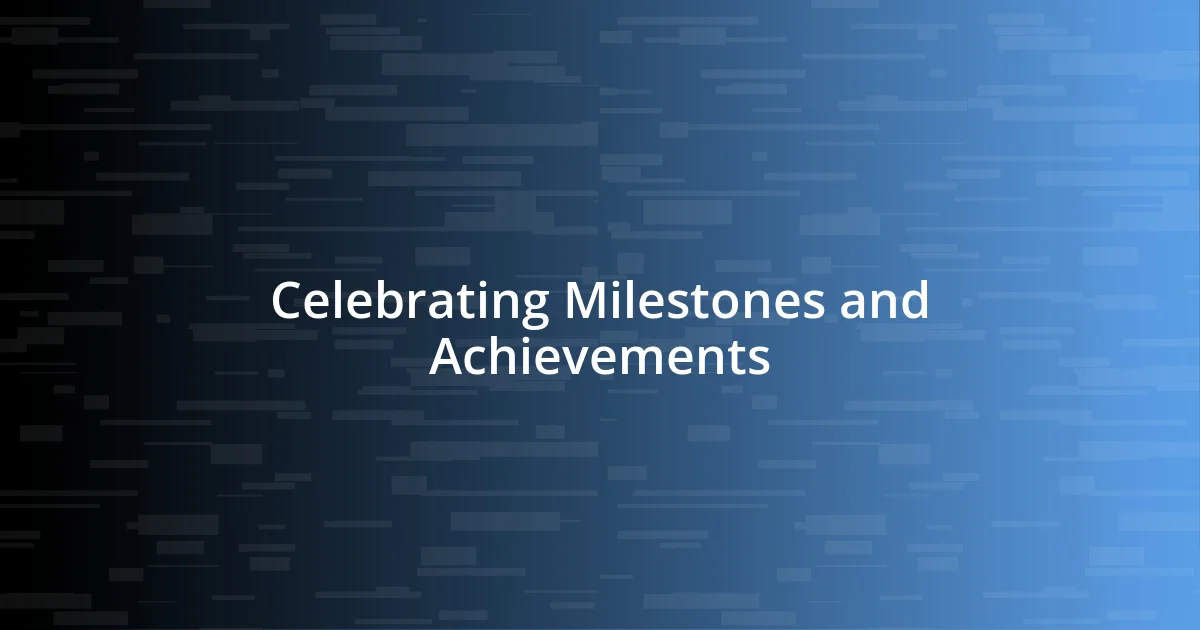Key takeaways:
- Tracking progress enhances motivation, accountability, and fosters a growth mindset by reflecting on achievements and setbacks.
- Choosing the right tracking tool and setting measurable goals are crucial for effectively transforming aspirations into tangible results.
- Regularly reviewing data and adjusting strategies is vital for improving productivity and achieving personal growth, while celebrating milestones reinforces motivation and enjoyment of the journey.

Importance of Tracking Progress
Tracking progress is essential because it serves as a real-time reflection of our efforts and achievements. I remember a time when I was working on a challenging personal project; each week, I would jot down my accomplishments and setbacks. This not only kept me motivated but also helped me adjust my strategies when I saw areas that needed improvement.
When I think about the emotional aspects, I feel that tracking progress provides a sense of accountability. Have you ever felt overwhelmed by a goal and unsure of how far you’ve come? I certainly have. Documenting my journey helped me gain clarity and pride in what I had achieved, even on tough days when my motivation waned.
Furthermore, tracking progress fosters a growth mindset. It encourages us to view setbacks as opportunities for learning. There was a moment during my goal-setting process when I faced a significant hurdle and felt like giving up. But looking back at my progress revealed how far I’d already traveled, reigniting my determination to push through. Isn’t it amazing how a simple glance at our path can shift our perspective?

Choosing the Right Tracking Tool
Choosing the right tracking tool is crucial in transforming our goals into tangible results. I’ve tried various tools over the years—some were too complicated, while others didn’t offer enough detail. For instance, when I first started using a simple checklist app, I found myself feeling frustrated because it didn’t provide the visual progress indicators that I craved. It’s essential to find a balance that resonates with your style.
When selecting a tool, I recommend considering your unique needs and preferences. Do you need something that integrates with other platforms, or are you looking for a dedicated app? I remember switching to a visual project management tool, which allowed me to create boards that visually represented my tasks. This made all the difference in my productivity; seeing my tasks move from “to-do” to “completed” brought me a sense of accomplishment that a list simply couldn’t match.
It’s also helpful to think about the long-term usability of the tracking tool. A few years ago, I found an all-in-one solution that seemed perfect initially, but as my projects grew, I felt it lack flexibility. Therefore, take time to assess if the tool can evolve with your goals, ensuring it remains a valuable resource in your journey.
| Tool | Pros | Cons |
|---|---|---|
| Checklist App | Simple and quick to use | Lacks visual representation |
| Visual Project Management Tool | Great for visual learners, interactive | Can be overwhelming if too feature-rich |
| All-in-one Solution | Comprehensive features | May become inflexible over time |

Setting Measurable Goals
Setting measurable goals is a game-changer in my journey toward progress. I’ve learned that clarity in what I aim for not only boosts my motivation but also helps me track my achievements in a tangible way. For instance, when I set a goal to improve my fitness, I didn’t just say, “I want to be healthier.” Instead, I defined it as, “I will exercise three times a week for 30 minutes.” This specificity made it much easier to evaluate my progress.
When setting measurable goals, consider these key elements:
- Specificity: Clearly define what you want to achieve. For example, instead of “read more,” say “read two books this month.”
- Measurable Criteria: Establish how you will measure progress, like tracking the number of pages read each week.
- Achievable: Set realistic goals that challenge you but remain attainable. It’s important to avoid setting yourself up for failure.
- Relevance: Ensure your goals align with your broader aspirations. This connection keeps you motivated and focused.
- Time-bound: Set a deadline for achieving your goal. Having a timeline, such as “complete a course by the end of the month,” adds urgency and encourages commitment.
Reflecting on my own experience, I remember setting a goal to learn a new language. Instead of vague aspirations, I committed to completing one lesson daily for a season. This structured approach kept me accountable and revealed my progress in real-time—nothing felt quite as satisfying as ticking off those lessons one by one. I found that each accomplishment, no matter how small, fueled my enthusiasm to continue.

Creating a Progress Schedule
Creating a progress schedule is something I’ve integrated seamlessly into my routine, and it truly makes a difference. When I first approached scheduling, I used to overcomplicate things, aiming for intricate plans that often fell apart. It wasn’t until I settled on a simple weekly outline that I began to see my progress skyrocket. Why? Because a straightforward, easily adjustable schedule allows me to remain flexible while maintaining focus on my goals.
One effective technique I utilize is breaking my schedule into smaller segments. For instance, I carve out time blocks for specific tasks during my workweek, which helps me visualize my progress in real-time. I remember one particularly busy month when I created a whiteboard calendar, dedicating each week to a different project. Seeing it all laid out brought clarity and motivation, and crossing off tasks became a kind of mini-celebration for me.
I also find that including regular check-in points within my progress schedule is crucial. At the end of each week, I take a moment to review what I’ve accomplished and adjust my upcoming tasks if necessary. This reflection period not only helps me celebrate my wins, no matter how small, but it also allows me to recalibrate my efforts. It’s a chance to ask myself, “What worked well? What needs tweaking?” Adjusting my schedule based on these insights often results in increased productivity and a deeper understanding of my progress journey.

Reviewing and Analyzing Data
Reviewing and analyzing data is an essential part of my process for tracking progress. I’ve found that simply collecting data isn’t enough; it’s about diving deep into the numbers and understanding what they truly mean. For instance, after a month of tracking my workout routines, I realized I was pushing harder on some days than others. This led me to ask, “What influences my motivation?” Taking the time to reflect on these details made all the difference.
One technique I use regularly is creating visual representations of my data, such as charts or graphs. I still remember the first time I plotted my monthly reading goals—seeing that upward trend was incredibly motivating. It’s a reminder of how visual cues can stir emotions and inspire continued effort. When I compare this month’s reading stats to previous ones, I feel a sense of achievement that no number alone could convey.
I also believe in the power of narrative when reviewing data. After evaluating my last quarter’s sales, I didn’t just look at the figures; I thought about the conversations I had, the strategies I employed, and even the setbacks. Reflecting on those experiences offered insights beyond the raw numbers and illuminated the path forward. What was a setback in one month became a learning opportunity for the next. This blend of quantitative and qualitative analysis is what keeps my progress on a meaningful trajectory.

Adjusting Strategies Based on Findings
When it comes to adjusting strategies based on my findings, I believe that flexibility is key. One instance that stands out was during a particularly challenging project at work. I was deep into my original plan when I noticed that certain methods weren’t yielding the results I expected. Instead of stubbornly sticking to my plan, I decided to pivot and experiment with different approaches. That shift not only reignited my motivation, but it also led to a breakthrough that transformed my outcomes.
I often ask myself, “What’s really working here?” This question prompts critical reflection. For instance, after I switched my study habits for an exam, I realized that my previous tactics weren’t effective for the type of material I was dealing with. By integrating more interactive techniques, like flashcards and group discussions, I found my retention improved significantly. It’s those moments of realization that highlight the importance of being willing to evolve my strategy as I gather more insights.
Ultimately, adjusting my strategies doesn’t just enhance my productivity; it also deepens my understanding of what I truly want to achieve. I remember a time when I set a goal to learn a new language. At first, I was committed to traditional methods, like textbooks and apps, but I felt bogged down. After analyzing my progress and feelings, I opted to join a conversation group instead. This simple switch not only made learning more enjoyable but also helped me connect with the material on a personal level. Isn’t it fascinating how small adjustments can lead to monumental shifts in our progress?

Celebrating Milestones and Achievements
Celebrating milestones and achievements is one of my favorite parts of tracking progress. I vividly recall the moment I hit my fitness goal for the year. Instead of just checking it off a list, I treated myself to a small celebration—a dinner out with friends. It was more than just a night of fun; it was a recognition of hard work and determination. Have you ever noticed how acknowledging achievements can reinvigorate your passion?
I find that sharing my milestones with others amplifies the joy. Recently, after completing a significant project at work, I organized a casual gathering with my team. We shared our individual accomplishments and supported one another. The atmosphere was electric, filled with laughter and inspiration. It reminded me that achievements are often more meaningful when celebrated together. How do you celebrate your victories?
Sometimes, it’s the little wins that matter the most. I remember the thrill I felt when I could finally meditate for ten minutes straight, something I had been working on for weeks. To commemorate this, I treated myself to a cozy evening with my favorite book and a cup of tea. It’s these simple moments that reaffirm my journey and keep me motivated. What small wins have you celebrated lately?














